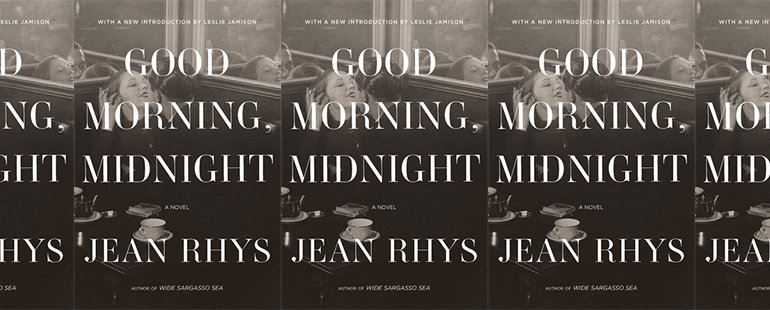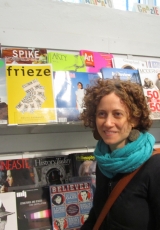Good Morning, Midnight and the Failure of Our Daily “Programs”

After publishing her debut, a short-story collection titled The Left Bank, in 1927, from 1928 through 1939 Jean Rhys wrote and published four novels, concluding with Good Morning, Midnight. This last book, published just as World War II broke out, was seen as “intolerably depressing”; it was forgotten, along with Rhys’s other books and Rhys herself, until she published Wide Sargasso Sea twenty-seven years later, in 1966—upon which her larger body of work was rediscovered. Each of Rhys’s first four novels, wrote A. Alvarez in The New York Times Book Review in 1974, “have the same heroine—although she goes by different names—the same background of seedy hotels and bedsitters for transients in Montparnasse and Bloomsbury, and they recount the single, persistent, disconnected disaster of a life in which only three things can be relied on: fear, loneliness and the lack of money.”
In Good Morning, Midnight, the heroine is called Sasha Jensen—though her given name, she implies at one point, is actually Sophia; she decided herself to call herself Sasha, she says, because “I thought it might change my luck if I changed my name.” When the novel begins, she has been in Paris for five days, staying at a cheap hotel on a cobblestoned street “going sharply uphill and ending in a flight of steps. What they call an impasse.” Previously, she had been staying in London, where she was trying to drink herself to death, so the trip to Paris, funded by a friend who says she couldn’t bear to see Sasha “looking like this” (getting older, needing new clothes), just might be a change in luck. It soon becomes clear, however, that for Sasha, Paris is indeed a city with many dead ends—full of too many bars and cafés she can’t revisit because she once “made scenes there, collapsed, cried.”
The novel proceeds without much plot. Sasha walks around Paris, goes to the cinema, meets a few men (a set of Russians and a gigolo who says he is French Canadian), eats and drinks at the bars and cafés where as far as she knows she has “a perfectly clean slate,” and remembers the past: working at a shop on Avenue Marigny and losing her job there, the death of her newborn, the end of her brief marriage. These memories come to her as seemingly disparate events; they are not connected by cause and effect, but rather associated with locations that Sasha passes as she walks. “There this happened, here that happened,” is a recurring refrain; early in the novel, Sasha reminds herself, “The thing is to have a programme, not to leave anything to chance—no gaps. No trailing around aimlessly with cheap gramophone records starting up in your head, no ‘Here this happened, here that happened’. Above all, no crying in public, no crying at all if I can help it.”
Reading the novel, I soon landed on the lazy word unlikeable to describe Sasha. The moment the word arose in my mind, I was suspicious; the term is cliché, especially when used in reference to women who, like Sasha, live outside of the narrow bounds of what society largely expects of women (wifehood, motherhood). Living outside of those bounds would have been even more precarious for a woman in 1930s Europe, and Sasha is an outsider in other ways, too. She never speaks of any family except obliquely as a “they” in England to whom she applies for more money. (“‘We can’t go on doing this,’ they say. ‘You insisted on it against everybody’s advice.’ And so on . . . . All right, I won’t ask you again. A Spartan lot, they are.”) And her nationality is to others a puzzle; she is (like Jean Rhys, who was born and raised in Dominica, then a British colony) not quite English.
What I found exasperating is Sasha’s inability to make a place for herself in the world, even on the margins. She lives in hotels on borrowed money and is unable to hold down a job long enough to get what she really needs—cash—for a “change in luck.” Her seeming incompetence at her job as the receptionist at the shop on Avenue Marigny is especially frustrating, for example. Upon the arrival from London of the shop’s boss, Mr. Blank, at first Sasha doesn’t know whether to stay seated or stand to greet him (she stands), then she stirs up confusion over whether or not she speaks French and German (it seems that she does, but she says she does not, and Mr. Blank is certainly convinced she does not), and then she recounts her spotty employment history (she held her last job, as a mannequin, nearly five years ago for only three months). Later, when Mr. Blank asks to bring a letter to “the kise,” instead of asking for clarification (he had mispronounced la caisse, “the cashier”), she wanders through the many passages of the building seeking the man whose name is on the envelope before returning to Mr. Blank, the errand uncompleted. “Extraordinary,” says Mr. Blank, “quite extraordinary. God knows I’m used to fools, but this complete imbecility . . . . This woman is the biggest fool I’ve ever met in my life.”
Sasha’s apparent failure of character here, exasperating as it is, nevertheless feels familiar. I, too, have experienced the confusion and humiliation that results from finding everyday interactions to be mysterious, simple instructions to be inscrutable, and the world to be a maze. I suspect that such experiences are common, though few people would admit their bewilderment. Sasha, though, bursts into tears, agrees with Mr. Blank that she is a fool, and walks out with her month’s pay, another job lost.
“He knew me right away, as soon as he came in at the door,” she says of Mr. Blank after crying herself out in a fitting room—“for myself . . . for all the sadness of this damned world, for all the fools and all the defeated.” What did Mr. Blank know? That she is a misfit, or unfit, and that she has no ambition whatsoever, except to get a better dress—“a black dress with wide sleeves embroidered in vivid colors—red, green, blue, purple. It is my dress. If I had been wearing it I should never have stammered or been stupid.” With a better dress—a better costume—perhaps she could play her part better and never be seen for who she is by such men as Mr. Blank. As it is, the best she can do is tell him off in her head, long after she is gone from the job:
You, who represent Society, have the right to pay me four hundred francs a month. That’s my market value, for I am an inefficient member of Society, slow in the uptake, uncertain, slightly damaged in the fray, there’s no denying it. So you have the right to pay me four hundred francs a month, to lodge me in a small, dark room, to clothe me shabbily, to harass me with worry and monotony and unsatisfied longings till you get me to the point when I blush at a look, cry at a word. We can’t all be happy, we can’t all be rich, we can’t all be lucky—and I would be so much less fun if we were. Isn’t it so, Mr Blank? There must be the dark background to show up the bright colours. Some must cry so that the others may be able to laugh the more heartily. Sacrifices are necessary . . . .
Sasha’s failure isn’t due to her character, then—who isn’t “uncertain, slightly damaged”?—but due to Mr. Blank’s cruelty, which is representative of society’s cruelty. In her view, this cruelty is, in fact, typical. “Human beings are cruel—horribly cruel,” she says at one point; later, she characterizes them as “a pack of damned hyenas” whom she fears and hates.
In a 1970 review for The New York Times of a just-reissued Good Morning, Midnight, John Leonard described Sasha’s mind as “not a nice place to visit.” Sasha, of course, lives there, and, adds Leonard, “mistakes that interior landscape for the ‘real’ world, just as we all do.” And yet, I certainly can’t discount her experience of the world as cruel, given how thoroughly the world has seemed to reject her. Even I want—or at least part of me wants—to reject her. How “unlikeable” she is! How incompetent! And, most of all, how unpleasant her view of the world and of other people! Meanwhile, today, the hyenas are in charge. People are dying, losing their jobs, their homes—after all, “We can’t all be happy, we can’t all be rich, we can’t all be lucky”!
I identify most of all, then, with Sasha’s need for a “programme” to get her through each day. Hers is intended to keep her from drinking too much, from crying in public; mine is intended to maintain some semblance (pretense) of normality in our home, for my family. These programs are at best provisional, as each day we encounter new catastrophes, and can fall apart in a moment. “My life, which seems so simple and monotonous, is really a complicated affair of cafés where they like me and cafés where they don’t, streets that are friendly, streets that aren’t, rooms where I might be happy, rooms where I shall never be, looking-glasses I look nice in, looking-glasses I don’t, dresses that won’t, and so on,” says Sasha after realizing that in an unguarded (possibly drunken, she speculates) moment, she has gone into a “hostile café.” And so she stumbles through Paris, unable to maintain her program, eventually landing in the arms of a man whom she detests and had been trying to avoid all along.


